By Steven Godfrey Mkweteza
In February 2017, Marita Phoso of Magulugulu village, T/A Malemia in Nsanje district had just come back from school when her mother told her that she should leave for Blantyre where she would be staying with her uncle.
According to Marita, her mother explained that she would no longer manage to send her to school and fend for her, some years after the death of her father.
“Obviously, I was excited and took this as a blessing in disguise as I was failing to pursue my education well and dreams of becoming a nurse later. This was due to difficulties my mother was facing in sending me to school,” said the now 18-year-old Marita.
Marita said her uncle, who was living in shanty area of Mbayani Township in Blantyre, had almost everything to raise and send her to school, looking at the financial status and kind of job he had. This according to Marita, offered a ray of hope that her life could be transformed.
In fact, Marita was one of the many deprived and destitute children who were orphaned at an age when she needed parental love, care and guidance the most.
Marita lost her father in the years she cannot remember and all she has of him are fading, distant memories. Her situation in this place of many realities people have to live with, having resigned themselves to fate, but her narration to the uncultured eye and ear, about the suffering she and her brothers and sisters go through every day, would move a tear in the hardest of hearts.
According to Marita’s mother, the death of her husband made her problems worse. She said she was left with the responsibility to take care of the seven children of her own and 3 daughters her deceased sister left with.
“ The pathetic situation was made even worse by the fact that our only surviving hope was a very old grandmother, who could hardly be depended upon as the other breadwinner,” she said, while putting on a brave face that belies the turbulent times she has been through.
As a result, Marita was nearly forced out of school, to join her old sisters in doing odd jobs to supplement the family’s meager income.
“Thanks heavens, I could nearly drop out of school because I had no clothes to wear and food to eat when going to school,” That is how Marita started the narration of her sad story.
But little did Marita know that her mother’s decision was a passport from a fruitful education career dreams to unwanted teen motherhood.
Just some few months in Blantyre, Marita says her 38 year-old uncle forcibly proposed secret love relationship to her in exchange of favours such as good schools, fashionable and expensive wears, devices, money and clubbing among other presents.
Since then, Marita reveals, life has never been the same despite being in this state of affairs, soldering on in search for hope that education gives. She said she has suffered several abuses for years and was for multiple times, infected with several sexual reproductive infections, a situation which eventually, affected her performance in class as she could not help to follow the lessons in a traumatic condition.
But surprisingly for her, she never reported the abuses, heeding her uncle’s advises that doing so would put the family in disrepute.
“He was a beast. Apart from abusing me in various ways, he has also for several times forced me to conceal pregnancy for fear of her wife’s knowledge,
“He also threatened to confiscate all what he had bought me and send me back home as a way of convincing me not to. In the end, frustrated as I was, and considering the abject poverty back in my home village, I could just give in to his demand,” said Marita, amid uncontrollable pool of tears.
Two years later, Marita unfortunately fell pregnant just before she had taken her end of term standard eight examination. This was after unsuccessful attempts to conceal the pregnancy as advised by her uncle.
At the meantime, Marita is back home, nursing her six month daughter as well as helping her mother in her veggies business.
In Malawi, while education is believed to be the greatest privilege a person can have in life but this is proving to be just a nightmare to many children especially those children who have lost parents. Each and every day messages of dangers of child sex abuse are disseminated widely but people are giving these messages a deaf ear and many children are becoming victims of their parent’s death.
Marita is the very personification of this sad scene. She had all the assurance of education until when death the salvage, snatched her father. On the other hand, Malawi’s tradition is very much constrained around the idea of community and dictates that in the event of a child losing its parents, the care is automatically allocated to the other members of the child’s family who, in most cases, take advantage of the situation and become beasts to the bereaved children.
Studies have shown that sexual abuse on children mostly comes from the least expected persons in the society. Children living with single parent, foster parents or a step mother or step father or children who are orphans are most prone to emotional trauma and often suffer from feelings of rejection and insecurity that may better accepted and loved.
Comprehensive statistics but the little available data indicates at around 65 percent of girls and 35percent of boys experience some form of child abuse during their lifetime and prior to the age of 18. Unfortunately, only 9 percent of girls who have been assaulted receive any professional help.
This is despite the country taking several positive steps to improve the situation of its most vulnerable children through enactment of among others, the child care, protection and justice Act (2010) and enforcement of the prevention of domestic violence Act (2000).
Furthermore, the country is also one of the signatories to the various international conventions on the elimination on the rights of children (I.C.R.C). However, these provisions mostly remain existent on papers in the country as the number of children into adulthood has been increasing.
According to experts, poor implementation of such legislations prevents the children from realizing and exercising their rights as human beings, such as rights to life and education.
Lack of appropriate knowledge and skills, cultural practices, illiteracy, gender inequality and poor access to media all contribute to continued risky attitudes and practices at individual, household and community levels. This is according to the monitoring and evaluation manager for the Centre for human rights, education, advice and assistance (Chreaa), Sphiwe Malihera.
Malihera said key findings of the baseline survey conducted by his organization and its cooperating partners between 2016 and 2017 in Blantyre district, indicated that child abuses are quite common and increasing at alarming rate.
He says the research revealed that over 540 children were sexually abused and their cases were reported at Queen Elizabeth Central Hospital through one stop centre.
However, Malihera said 90 percent of the cases have not been concluded in the courts of law as anticipated because of slowness in handling the cases.
“We also found that most perpetrators of the cases were parents, guardians, neighbors or relatives of the victims. Unfortunately, the cases were not oftenly reported whenever the perpetrators were deemed to be relatives to the victims,” said Malihera, adding that sometimes perpetrators were not aware of the law, a development which he said, make them to keep cases of abuses under the laps.
Therefore, Malihera said his organization together with several justice arms have embarked on an access to justice project called” Access paralegal services at one stop Centre at queen Elizabeth central hospital in Blantyre, whereby they are engaging children and other involved stakeholders to know all forms of sexual abuse that are subjected to and follow the right systems of reporting such cases to relevant authorities.
“We want speedy justice for the victims of gender-based violence and other human rights abuses. Therefore, are hopeful that if we educate these children and other authorities they will now be motivated to be telling their parents to report to relevant authorities or they can report on their own,” said Malihera at one of the training workshops at ammalysis Hotel in Blantyre.
Under the project, participants are mobilized and trained in positive discipline techniques to support girl’s education in their areas and on other knowledge to create a school and home environment safer and child friendly.
The project, which is being implemented in Blantyre district with prospects of being extended to other districts based on its results, also support the judicially in court sessions to increase access to justice for victims of abuse through bringing justice closer to the people.
Furthermore, the project, which has the community, based paralegals from the districts traditional authorities, primary school teachers, social welfare officers, police officers and child protection officers or any other appropriate person-holds separate discussions with children to educate them on the impact of human rights and gender violations.
In a separate interview, Emmanuel Kalungu, a child protection officer for police based at one stop centre victim support unit, his station through community policing department conducts counseling sessions and various awareness programmes aimed at providing safe living for all citizens including girls.
In his contribution, the child protection officer in the ministry of gender, community development and social welfare Beatrice Maharu, said it was pleasing that most village heads have accepted the concept and are also taking a leading role in making sure that parents are fully engaged.
“The project has really opened a new chapter in our children’s education future and we will make sure that the objectives of this project are fulfilled so that girls, especially, are empowered to contribute to the development of our district and country as a whole,” she said.
According to Mphatso Nawena, the project is having a great impact in the areas and many more people including children are actually participating in reporting gender abuses and responding to violence against children through various means that are accessible to them such as the presence of child protection officers and community policing officers.
Senior chief Kapeni was quick to bemoan the tendency of those who deliberately abuse orphans knowing they have nowhere to take their cases to.
The chief pointed out that there are unfortunately no stiff punishments in place to defend such vulnerable children.
Kapeni added that the absence of stiff punishments to perpetrators of such malpractices by authorities is hindering the efforts to curb the increased of such cases.
“Engaging in relationships with your child is totally wrong. Parent’s role is to help children have a good future. Therefore, Seductive parents or guardians deserve severe punishment. Should they again found abusing children, they will surely severely punished,” he warns
Josephine Mkodzola, a resident of Mbayani Township said it’s painful to see the way children are being abused when their parents are dead.
“As a parent it really pains to see how children are treated when their biological parents are gone. For instance, children are given workload above their age, raped and even denied chance to attend education,
“The end result of this is that these children venture into immoral behaviors like prostitution, drug and alcohol abuse, theft. All this is done not out of their will but out of frustration of what they are going through,” she said.
All in all, Marita’s quest to education and ambitions to become a nurse, however, has not diminished and if given a choice, she says, she would rather be in a classroom rather than marry because her dreams reach out to places that only a proper education can reach her to greater heights and sustain her life and those of her relatives.




